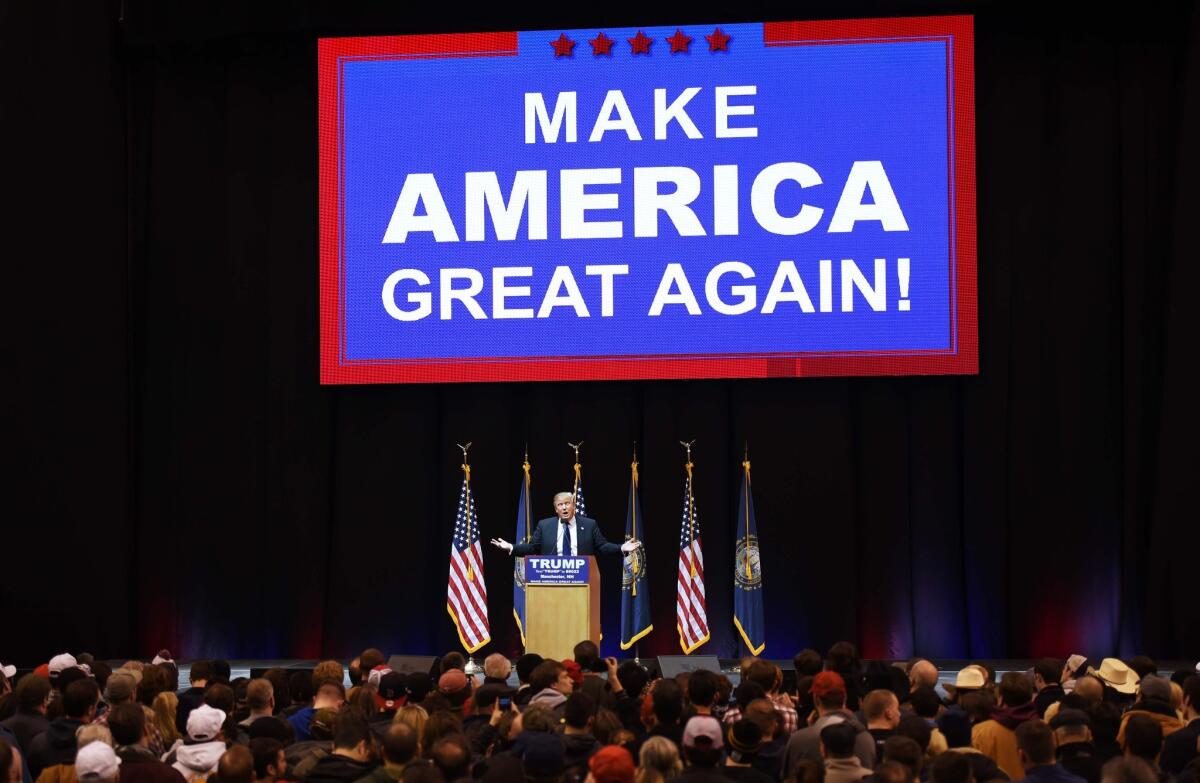Column: Trump and Sanders are the logical result of government that doesn’t deliver

Republican presidential hopeful Donald Trump speaks to the crowd during a rally in Manchester, N.H. on Feb. 8.
- Share via
For most of a year now, pundits (including me) have been surprised by the rise of Donald Trump and Bernie Sanders, the populist outsiders in the presidential campaign. We shouldn’t have been. The ingredients for a voter rebellion were in plain view all along.
They begin with the economy. For years – make that decades -- economists have observed that long-term growth is slowing and family income is stagnating. Pollsters have found that Americans aren’t merely pessimistic, they’re increasingly angry with Washington’s failure to solve basic problems. And historians have warned that when incomes don’t grow, voters often get impatient with political systems that don’t deliver.
Of all the candidates on offer, Sanders and Trump are the ones speaking most directly to voters’ economic anxieties and their anger at a failing political system.
Add those factors together, and you have more than just a topsy-turvy election campaign; you have the makings of a serious challenge to democracy. That may sound alarmist, but the tocsin is being rung by some pretty sober people.
“A sense of growth in standards of living for middle-class families, where parents believe that their children are going to live better lives than they do, is essential for almost every other national objective,” former Treasury Secretary Lawrence H. Summers said in a lecture last week at Johns Hopkins University.
“My greatest fear,” he continued, “is that we will become captured in a vicious cycle” in which the world’s economies fail to grow, confidence in governments sags, voters look for populist saviors – and when those governments fail, too, the cycle begins again: “It is not an accident that Hitler came to power after a hyperinflation and a depression.”
For a second voice, here’s William A. Galston, a former policy adviser to Bill Clinton who’s now a scholar at the Brookings Institution.
“In modern democracies there’s an implicit bargain between average citizens and their leaders,” Galston told me. “Leaders have promised broadly shared economic growth and … a measure of security to average citizens.... When the deal breaks down because leaders don’t live up to their side of the bargain, all bets are off. You get protests, and protest candidates, across the political spectrum.”
At that point, he warned, “democratic systems may enter a danger zone. Some countries in Europe are already there. I don’t think we’ve reached that point in the United States.”
But the trends are sobering. A CBS News poll in 2014 found that only 23% of Americans expected their children’s lives to be better than their own – and that was in a year when the economy was improving. In a Gallup Poll last week a massive (and bipartisan) majority of 81% said the government was failing to solve the country’s major challenges. An even larger 84% said a big part of the problem was “powerful special interests having too much control over what the government does.”
And that brings us back to the primary campaign. Of all the candidates on offer, Sanders and Trump are the ones speaking most directly to voters’ economic anxieties and their anger at a failing political system. They offer very different policies, of course, but they start from many of the same premises. Both say traditional politics has failed. Both say political insiders and their wealthy donors have hijacked the process. Both promise to take the government back for the people.
Sanders has made economic inequality his centerpiece; the main problem he wants to solve is the unfair distribution of income into the pockets of “the billionaire class.”
Trump’s campaign initially focused on illegal immigration, but he has a populist economic platform, too. It includes trade protectionism, beginning with punitive tariffs against China, but he also promises more economic security for the middle class; he’s denounced conservatives who want to cut spending on Social Security and Medicare.
Other candidates have tried to speak to voters’ economic anxieties, too, of course. Hillary Clinton has rolled out a long list of tax proposals and financial reforms; Ted Cruz, Marco Rubio and other Republicans have promised the traditional GOP remedies of tax cuts and budget austerity. But in New Hampshire, at least, the vivid populism of Sanders and Trump sold better among middle-income voters.
Could a Sanders or Trump administration turn the economy around in short order? That’s hard to imagine. A Sanders program of stimulus spending, income redistribution and government-run healthcare would need a liberal Democratic Congress to pass, and that’s not on the horizon. Most of Trump’s policies are too vague to assess, but even a President Trump would have to contend with a measure of gridlock on Capitol Hill.
And so would all the other candidates — unless, like Barack Obama in 2008, the next president wins in a landslide that ensures control of Congress. Even then, the problem of economic growth would still be there.
Summers thinks the chances of a recession are roughly even in the next few years (about one in three this year) – no matter who the next president turns out to be. If he’s right, the challenge to democracies – in both Europe and the United States – will only grow steeper.
Twitter: @doylemcmanus
Follow the Opinion section on Twitter @latimesopinion and Facebook
More to Read
A cure for the common opinion
Get thought-provoking perspectives with our weekly newsletter.
You may occasionally receive promotional content from the Los Angeles Times.











